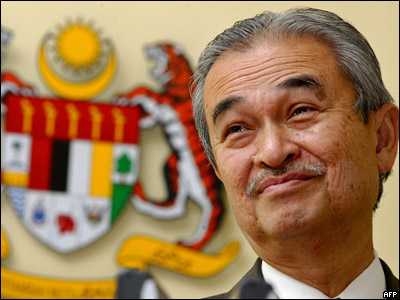In early 2008, Malaysia’s last two economic corridors, the Sabah Development Corridor and the Sarawak Corridor of Renewable Energy were launched to bring further social and economic development to the economically backward states of Sabah and Sarawak in East Malaysia. These economic corridors, including the three launched earlier in Peninsular Malaysia – Iskandar Malaysia, the Northern Corridor Economic Region and the East Coast Economic Region – aim to ensure a more regionally balanced socio-economic development of the nation. There are, however, criticisms of the speed of implementating projects.
In early June the government announced that it would remove controls on the price of petrol and allow fluctuating prices; a move that was unprecedented, given that the surge in global oil prices resulted in a ballooning fuel subsidies bill. Petrol subsidies were not totally removed, only decreased, and petrol pump prices were revised from time to time to reflect market price movements.
In December, the government announced that it would set a ceiling price at RM2.70 a litre, and give a subsidy of 30 sen per litre if the market price moved above RM1.90 a litre. Any fall in the market price to below RM1.90 a litre will result in the imposition of a tax, the quantum of which is still being discussed.
The central bank’s Overnight Policy Rate was kept at 3.50 per cent over the first three quarters of 2008, even though GDP quarterly growth had been moderating successively, from 7.1 per cent to 6.7 per cent to 4.7 per cent. In November, the central bank finally reduced its OPR by 25 basis points to 3.25 per cent.
Recently published third quarter data indicate that the country’s overall balance of payments recorded a deficit of RM31.5 billion, as compared to a surplus of RM26.2 billion in the previous quarter. This deficit was due largely to a significant drop of RM61.5 billion in the capital and financial account. In the previous quarter, the drop had been just RM12.3 billion. The current account balance, on the other hand, remained positive with a surplus of RM38.7 billion, a slight increase from the surplus of RM37 billion recorded in the previous quarter.
The fuel subsidy cut in June resulted in inflation soaring to 7.7 per cent in that month, compared to 3.8 per cent in the previous month. Compounded by escalating food prices, the inflation rate rose further to 8.5 per cent in July. By November, the inflation rate eased to 5.7 per cent.
In November, Malaysia finally announced a 7 billion-ringgit economic stimulus package to avert recession in 2009. The package has been criticized by some quarters as too late, and too little to adequately contain the impact of the global economic crisis on Malaysia. Criticism has also been leveled at how the 7 billion ringgit will be spent, as the package will go mostly to towards the construction and upgrading of low-cost housing units, schools, roads and public amenities.
Political tsunami
The results of Malaysia’s 12th general election on 8th March 2008, which has been hailed as a ‘political tsunami,’ a ‘political near-revolution’, and one that its citizens will be talking about for years, revealed an immense groundswell of public opinion against the ruling government and/or a rejection of race-based politics. Liberals regard it as a new dawn for democracy in Malaysia, a positive move towards constructive political development, and good for the nation’s long-term future.
For the first time since Malaysia gained its independence in 1957, the ruling coalition government lost its crucial two-thirds supermajority, which for a long time had enabled it to amend the constitution at will to its own advantage. On top of that, the government lost five of 13 state legislatures, as compared to only one in the 2004 election.
For the quiet Malaysian, the political change had been long in coming. There have been persistent complaints that the government has not done enough to tackle massive institutionalized corruption, issues of poor governance, non-tranparency, ethnicised politicking, and religious and ethnic insensitivities. Many share the view that the government has lost touch with the very people who voted them in.
The message of the loose coalition of opposition parties was loud and clear: that they are a viable alternative, and would tackle the issues uppermost in people’s minds. The success of the opposition alliance can be attributed to its ability to use new technologies such as blogs, mobile phone text messages and YouTube during the 2008 election, a milestone in Malaysian politics, to circumvent tight media control by the government.
Malaysia appears to have been forced by the success of the opposition parties in the 2008 election to embark on a bout of democracy. Already there are signs of change within the ruling coalition, as change will be necessary to its continued political survival.
But after a half century in power, it is hard to change, and there is much internal resistance to it, so UMNO’s days may at last be numbered.
—
Quah Boon Huat is a research fellow at the Malaysian Institute of Economic Research (MIER). Prior to joining MIER, he worked in the banking and stockbroking industry.
This is part of the special feature: Reflections on developments in Asia in 2008 and the year ahead

